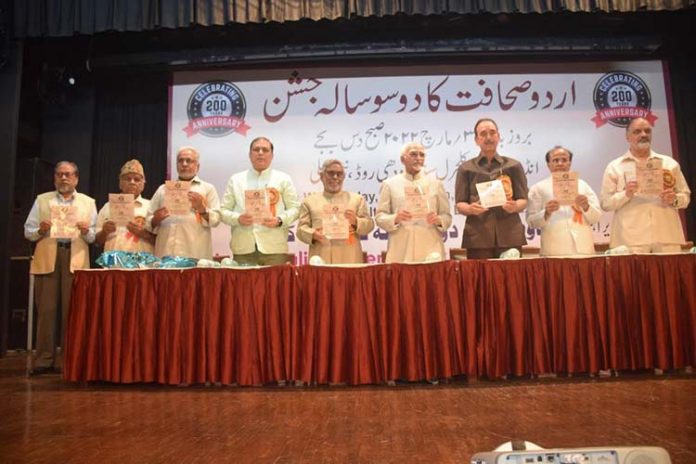By S.A.H. RIZVI
New Delhi Bureau Chief
The Times Kuwait
At 92, Dr. Mujawir Husain Rizvi is the oldest surviving journalist whose writings in Urdu wielded power to stir the then Central government in New Delhi. Today, at a time when the Urdu press is celebrating its bicentennial in India, he remains a towering figure with his journalistic and literary accomplishments in Urdu.

Despite his advanced age Dr. Rizvi has a photographic memory. It was in 1947 when Dr Rizvi then just 17 and studying for his graduation at Allahabad University took over as the Editor of Naya Daur, an Urdu bi-weekly newspaper at a salary of Rs15. “The paper was on a downward slide and could hardly meet its running expenses. Even the salary that I was offered would come in instalments,” recalls Dr. Rizvi.
With a perfect command of Urdu, Dr. Rizvi redesigned the newspaper giving it a bold outlook and incisive editorial inputs which attracted the best of intelligentsia in the city. “We would collect news dispatches of agency feed from the leading English dailies of the city and translate the news segment,” he said, adding,“so meagre were our resources”.
Naya Daur however shot to fame two months later when he wrote a front-page open letter to the then Education Minister Maulana Abul Kalam Azad protesting over a local politician who led a mob to attack shops of petty traders and vitiating communal atmosphere. A prompt action came from Delhi and the paper made its impact.
Immediately the paper was converted into tri-weekly. Simultaneously, he was asked to help another daily newspaper, Hamara Akhbar. Dr. Rizvi continued his journalistic foray till 1967 and then took to academics. A prolific writer, he edited Nakhat Magazine and wrote a series of fictional stories as well.
“We never compromised on principles and that was our only asset. But now things have changed,” said Dr. Rizvi. True in its 200-year-old existence Urdu journalism was in the forefront of the fight against British imperialism. As the organiser of the bicentennial celebrations of Urdu Journalism and noted journalist Masoom Moradabadi said, “we nursed journalism with our blood”.
As far as the first Urdu newspaper is concerned, it was Jam-i-Jahan Numa published from Kolkata by Pandit Harihar Dutta in March 1827. The editor of Jam-i-Jahan-Numa was Pandit Sada Sukh Lal. Contrary to widespread perceptions, Urdu newspapers were launched by Hindus. It is also true that the contribution of non-Muslims to Urdu journalism is not less than Muslim journalists.

Soon after the birth of Urdu journalism, it began to express its dissents against the foreign rule. Mohammad Moulvi Baqir, the editor of Delhi Akhbar, boldly wrote against the exploitative British rule and sided with the freedom fighters during the 1857 Revolt.
Masoom Moradabadi who has done extensive research on Maulvi Baqar says the British government, in order to suppress the dissenting voices, blew Moulvi Muhammad Baqir by tying him from the mouth of cannon.
“However, this barbaric action of the colonial rule did not dampen the Urdu journalists’ spirits, and they continued to play an important role in the country’s freedom struggle,” Masoom said. The bicentennial commemoration function, which was held recently, was inaugurated by former Vice President Hamid Ansari and attended by a galaxy of Urdu journalists and Editors.
“We are working on several projects to commemorate the bicentennial celebrations. We are collecting old documents and manuscripts and then publishing them. I want to leave them for the future generations,” said Masoom.

















